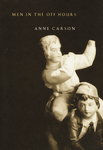Click here to install the Quicktime Player, if the links below to the video clips do not work.
TURN THE VOLUME ON YOUR COMPUTER UP TO LOUD BEFORE PLAYING CLIPS.
DECREATION
An Opera in Three Parts
by Anne Carson
* * *
Introduction
Decreation was performed Monday, April 30th, 2001 at 7:30 p.m. at the Culture Project in New York City.
The performance was a benefit for Fence Magazine.
Part One: Love's Forgery
clip I / clip II
Characters:
Hephaistos: lame god of the forge and husband of Aphrodite
Aphrodite: goddess of love and wife of Hephaistos
Ares: god of war and lover of Aphrodite
Volcano Chorus: 7 female robots built by Hephaistos to help him at the forge
Argument:
Jealous of his wife Aphrodite who has taken Ares as her lover, Hephaistos broods darkly in his mind. Since he is the god of the forge--god of fire, art, craft, igneous eruptions and technological cunning--he goes to his workshop and fashions a trap out of volcanic chains hammered so thin they are all but invisible. With the help of his robots he rigs up this trap around the bed (his own bed!) where Ares and Aphrodite like to mingle in love. Hephaistos hides. Ares and Aphrodite enter the bed. Kiss, etc. The trap entraps them. Hephaistos emerges from hiding and exults over the lovers. Rage and exhilaration of Hephaistos. Ares and Aphrodite begin to bargain lightheartedly with Hephaistos to release them. Hephaistos' high mood shifts down gradually to sadness as he realizes that by their lightness they have already won. Hephaistos undoes the trap. Ares and Aphrodite bound away to perfumed places. Hephaistos disassembles the trap and lies down in the bed by himself.
Part Two: Her Mirror of Simple Souls
clip I / clip II
Characters:
Marguerite Porete: mystic and heretic of the 13th century
God
Quidnunc chorus: 15 papal inquisitors
Argument:
Nothing is known of Marguerite Porete's background or origin. She appears like a stain on the air of medieaval theology about 1296 as author of a book called Le Mirouer Des Simples Ames Anienties Et Qui Seulement Demourent En Vouloir Et Desir D'Amour. (The Mirror of Simple Souls Annihilated And Those Who Only Live in Longing and Desire of Love) which provoked the wrath of the papal inquisition because of its form as well as its content. For Marguerite wrote her Mirror in vernacular French--not in Latin, which was the official language for thinking about God. When she was instructed by the Church to stop disseminating her ideas this way Marguerite refused. When she was arrested by the Inquisition and told to answer questions about her amazing, inebriated book, Marguerite refused. When she was required by the Inquisition to vow she would not teach or publish ever again, Margeurite refused. When she was ordered to recant her refusal on pain of death Marguerite refused. Marguerite's trial for heresy took place during the spring of 1310. At noon on June 1st of that year she was burned to death in the public square of Paris.
Part Three: Fight Cherries
clip I / clip II
Characters:
Simone Weil: Philosopher and mystic
Mme. Weil: mother of Simone
M. Weil: father of Simone
Chorus of the Void: 10 transparent tapdancers
Argument:
Simone Weil's life was caught in the net of her parents' care. They cherished, warned, worried, plotted, stocked her fridge, sent her sweaters, followed her to war and transposed her to America (briefly). She took lunges through the net--into Descartes, into Plato, into trade unions and communism and Homer and theology and the arts of hunger. She did not want to be a woman. She wanted to disappear. Certain aspects of disappearance had to be concealed from the parents and so her many letters to them are repetitions of the one same glowingly factitious postcard that every good daughter sends home--Dear people what splendid weather thanks for the chocolate I'm making lots of friends here kisses to all--meanwhile she was dying. And when she did die the telegram astonished them: her last letter from London had said everything was fine.




